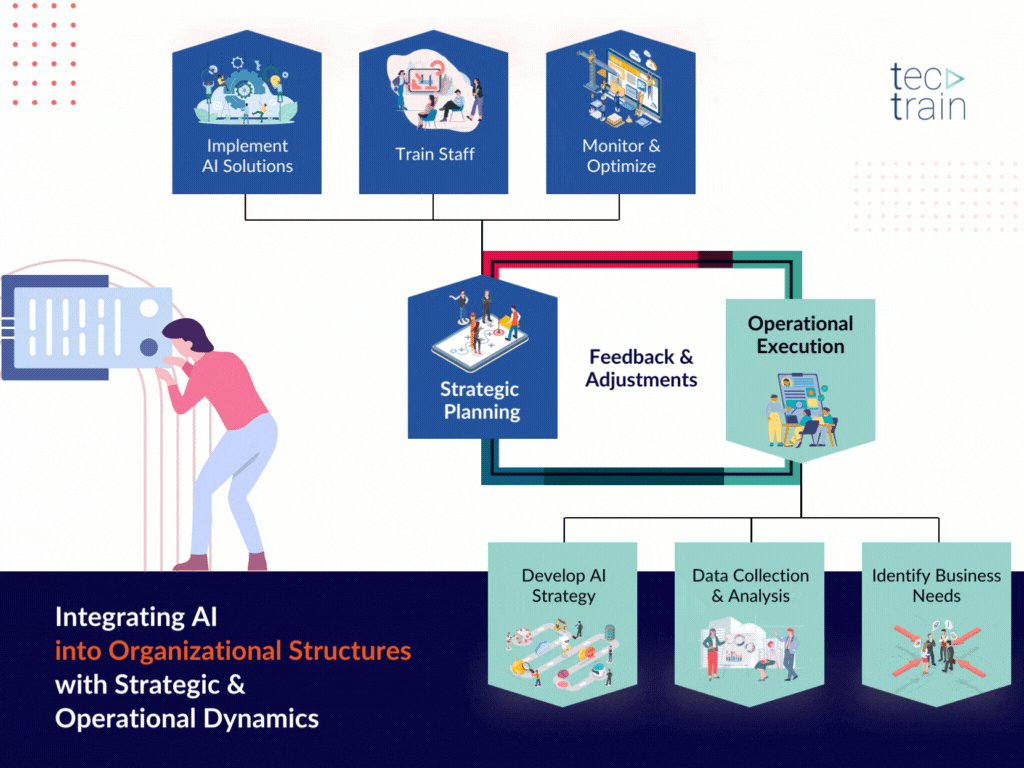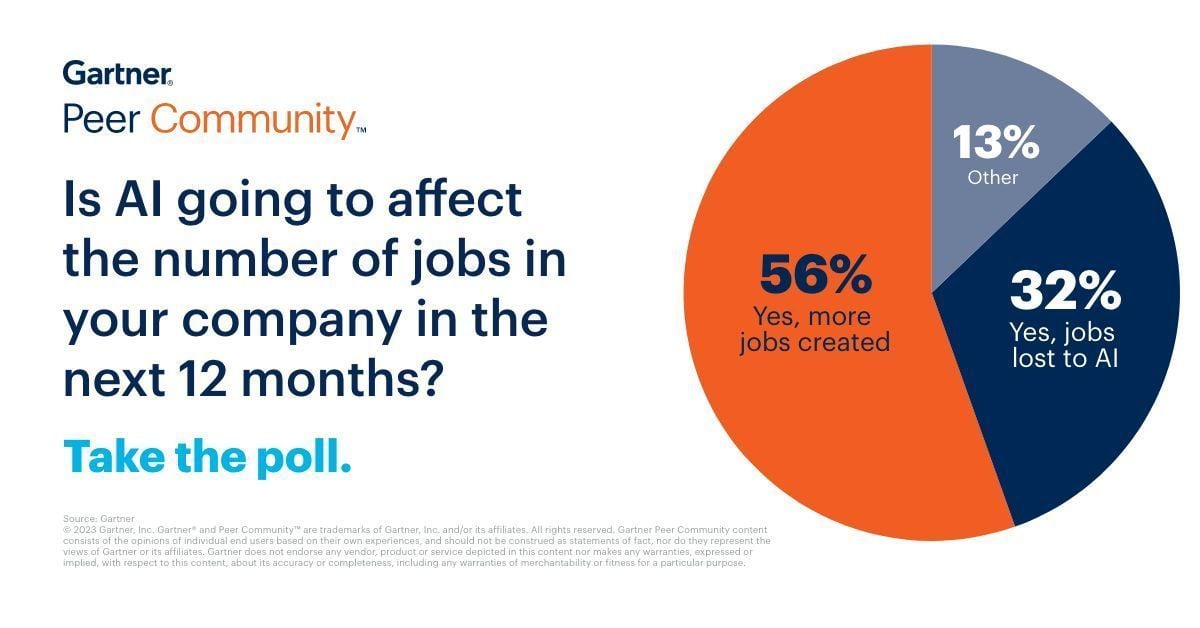Key Takeaways
- In 2024, expect generative AI to be a major player in IT. It's going to make things faster and smarter, from automating tasks to spurring growth. Think of it like a turbo boost for over 80% of businesses, a huge jump from where we are now.
- AI's not just a cool tech trend; it's transforming how businesses work. It's about making decisions smarter and operations smoother. It's changing the game in how businesses approach their processes.
- AI's teaming up with agile methods to make IT more flexible and quick to adapt. This combo is all about keeping up with the fast pace of tech and making sure businesses can roll with the punches.
- What Should We Watch Out for with AI in IT? Sure, AI's got its perks, but it's not without its headaches. We've got to think about keeping data safe and what it means for jobs. It's all about using AI smartly and responsibly.
- AI's always changing, and to keep up, learning can't stop. Staying on top of the latest in AI means teams can stay agile and innovative. It's not just about knowing the current tech; it's about being ready for what's next.
The Pros and Cons of AI in Digital Transformation
In today's fast-changing digital world, the IT sector is undergoing a major shift, especially in the area of Digital Transformation, largely driven by the latest advancements in Artificial Intelligence, particularly Generative AI. This blog post aims to clearly explain "How Generative AI Will Impact IT Sector in 2024," focusing on the intersection of IT and Digital Transformation. We'll provide insights based on thorough research and highlight Tectrain's expertise in agility and digital transformation training.
As we unpack this topic, you might even wonder, "Is this AI generated?" – a question that underscores the impressive capabilities of modern AI technologies. Our exploration is not just about tech trends; it's about understanding the significant changes that AI is bringing to the IT sector and beyond.
Artificial Intelligence (AI) is a big part of digital transformation in IT. It changes how we work and make decisions. But, it's important to think about both the good and the bad sides of AI.
Enhancing Efficiency vs. Ethical Dilemmas
Artificial Intelligence (AI) is playing a significant role in the journey of digital transformation, bringing numerous advantages. It simplifies our work by automating routine tasks, enhances the way we analyze data, and sharpens our decision-making processes. However, it's important to recognize the ethical challenges AI presents, such as concerns about privacy and the potential impact on jobs. For businesses, understanding both the benefits and the challenges of AI is crucial to effectively navigate this evolving landscape.
AI is revolutionizing the IT sector by speeding up tasks and making decision-making more efficient. By taking over repetitive jobs, AI allows employees to concentrate on more complex and engaging tasks. This change not only boosts productivity but also makes work more interesting and fulfilling for individuals.
However, using AI in IT also brings challenges. One big concern is privacy. When AI handles a lot of data, including personal information, it's important to keep this data safe and respect people's privacy. Companies need to follow rules and use strong security to protect this information.
Another issue is about jobs. As AI takes over simple tasks, some jobs might change or become less needed. This means people might need to learn new skills to work with AI or do different kinds of jobs. Companies should help their employees learn these new skills.
AI is very useful in IT for making work faster and smarter. But, we need to use AI carefully, thinking about privacy and jobs. This way, AI can be a positive force in digital transformation.
Democratized AI: Balancing Accessibility & Control
Democratized AI is reshaping the IT world, making high-tech tools more available to everyone. This big change is a key part of digital transformation, bringing both exciting possibilities and some tough challenges.
Gartner's report shows just how big this change is. They predict that by 2026, more than 80% of businesses will be using generative AI, a huge leap from less than 5% today. The reason? AI is great at automating tasks, which makes businesses more productive and opens up new ways to grow.
But, with AI being easier to get, it's really important to keep an eye on how it's used. Gartner suggests making a plan to figure out which AI projects are worth doing, based on what they can do and how valuable they are. It's also key to teach people how to use AI tools the right way, helping them understand that AI is there to help them, not take their jobs.
Having an agile IT setup is super important here. It means that as AI becomes more common, companies can stay flexible and quickly adapt to new changes, making AI a smooth part of their daily work.
So, democratized AI is a big deal in digital transformation. It's got a lot of power, but it needs to be handled with care and a smart IT approach to make sure it's used right.
On one side, democratized AI in the IT sector, as highlighted in the Gartner report, promises increased accessibility to advanced tools, boosting productivity and growth. On the other hand, the same technology can be misused to generate convincing disinformation at an unprecedented scale, as illustrated in the Fake News 3.0 blog article. A Forbes Advisor survey reveals that 76% of consumers are concerned with AI misinformation.
This all shows why it's so important to balance getting to AI with keeping it under control. While democratized AI can really change how businesses and IT work, it also needs strong rules and the right ethics to stop it from being misused.
Featured Resource:
Fake News 3.0: The Era of Automated Fake Information
Management of Digital Transformation: A Strategic Approach
In the fast-paced world of IT, digital transformation is more than just adopting new technologies; it's about embedding Artificial Intelligence (AI) into the very fabric of organizational structures. This strategic integration is crucial for businesses aiming to stay ahead in a digitally-driven market.
Integrating AI into Organizational Structures

Digital transformation in the world of IT is way more than just picking up the latest tech. It's really about getting AI deep into how an organization works. Think of it like this: it's not just about having the tools, but knowing how to use them in a way that really changes the game.
That's exactly where the concept of agile IT organization design for digital transformation and continuous delivery becomes crucial. It's all about ensuring that the tech side of a business is not just equipped but also flexible enough to adapt to the rapid changes and challenges of digital transformation. This agile approach doesn't just benefit the tech team; it elevates the entire company's performance.
Now, let's add AI into the daily business equation. With AI in play, regular tasks get a significant boost – it's like hitting the fast-forward button. Work gets done quicker, decisions become more precise, and creativity flows more freely. But, integrating AI into business processes is more than just a plug-and-play scenario. It requires a fundamental change in approach. Moving away from traditional, rigid structures to a more fluid, dynamic way of working is key. This is where agile IT organization design for digital transformation and continuous delivery shines. It enables teams to collaborate more effectively and adapt swiftly to new developments, leveraging AI's full potential in a constantly evolving business landscape.
Fostering a Culture of Continuous Learning and Adaptation
And here's a key point: keeping pace with all these changes means constantly learning and evolving. It's not just about formal training programs; it's about creating a culture where learning is part of the daily routine. This way, teams become more adaptable, ready to face new challenges and brainstorm innovative solutions on their own. It's about fostering an environment where curiosity and continuous improvement are part of the team's DNA.
So, when you get down to it, steering through digital transformation isn't just about the tech. It's a whole new way of thinking and doing in the business world, with a big focus on being agile and always ready to learn. By getting on board with this, companies aren't just keeping up; they're setting themselves up to lead the way in the digital world, boosting their tech game and taking their performance to the next level.
Real-World Examples
AI-Driven Success Stories
To illustrate the impact of AI on digital transformation, let's explore real-world examples. Companies across various sectors have successfully implemented AI to streamline operations, innovate product offerings, and improve customer experiences. These success stories serve as a testament to the transformative power of AI in the IT sector.
AI-Driven Success Stories: A Lively Tour with Adrianne P.
Alright, let's dive into some absolutely smashing stories about AI in business, all brought to light by the brilliant Adrianne P. She's got this knack for uncovering how AI is really shaking things up in various industries. It's not just about the tech; it's about real change happening right now.
- First up, let's chat about American Express. They've gone and harnessed AI to get a better grip on their customer data. What's the result? A massive boost in how they connect with customers. It's as if they've got this crystal ball, thanks to AI, showing them exactly what their customers are after. This clever use of AI has led them to whip up marketing strategies that are spot on, giving their business a hefty leg up.
- Now, onto UPS, the big name in logistics. They've been using AI to spruce up their supply chain operations. By crunching the numbers, they've cut down on delivery errors and ramped up customer satisfaction. It's a brilliant showcase of how reliable and efficient AI can be in getting things from A to B.
- And who can forget Netflix? They've used Business Intelligence to give their content recommendation system a bit of pizzazz. It's like they're reading their viewers' minds! By figuring out what people like and don't like, they've become ace at suggesting just the right shows and movies. This personal touch has not only made viewers chuffed but also given Netflix's earnings a jolly good boost.
- Let's not leave out Starbucks. By blending AI and BI, they've fine-tuned their supply chain and cut down on waste, leading to some serious savings. Their AI-driven approach in order fulfillment and inventory management has really upped the ante on customer experience.
Taking a gander at these stories from Adrianne P., it's clear as day that AI is making a hefty mark on digital transformation, especially from an "IT capability and digital transformation from a firm performance perspective." AI's like this secret sauce for businesses, spicing up customer experiences and smoothing out operations. These aren't just tales; they're proof that AI is a game-changer for companies looking to shine in today's digital world. By beefing up IT capabilities and embracing digital transformation, firms are seeing a real uptick in their overall performance, all thanks to AI.
Intelligent Applications and Augmented Connected Workforce
Let's talk about how smart apps and a better-connected workforce are really making a difference in various industries. It's all about making work more productive and teamwork smoother in the digital world. Seeing these examples, you get a clear picture of how AI is practically helping businesses change their game.

There's this interesting bit from a Gartner Peer Experiences poll. A top sales executive from a software company said, “AI is enhancing the jobs at our company and not taking away or adding jobs.” This view is part of a growing belief that AI and smart tech are more about boosting jobs rather than replacing them. You can check out more on this and even join in the poll right here.
This whole thing ties in with what's being talked about in tectrain Academy's research paper "Skill Shortage in Europe 2024." The paper digs into how using AI and new tech in the workforce could be a way to fill in the gaps in skills across different industries. By getting new hires up to speed faster and beefing up the skills of current staff, AI could be a real game-changer in tackling skill shortages.
Gartner's report also throws in this prediction: by 2027, about a quarter of CIOs will be using tech to make their workforce more connected and reduce the time it takes for key roles to get good at their jobs by half. This approach is super important in areas where keeping up with tech changes quickly is key.
Putting these ideas into practice means companies should focus on creating work experiences that are boosted by smart tech. This is about building systems that give useful insights and tips, helping employees handle tasks that used to be too tough or take too long.
So, wrapping this up, bringing AI and smart applications into the workforce is a big deal for tackling skill shortages and making jobs better. If you want to dive deeper into how these techs are changing the work scene and helping with skill gaps, I'd really suggest giving tectrain Academy's report "Skill Shortage in Europe 2024" a read. It's packed with good info and insights for anyone interested in how the digital workforce is evolving. You can grab the report right here and get the full scoop.
Featured Resource:
Skill Shortage is growing in Europe: New Case Study 2024
The Significance of Artificial Intelligence Software in Digital Transformation
Artificial Intelligence (AI) software is crucial in the digital transformation of businesses. It changes how companies operate and compete.
Tools and Technologies Driving Change
Artificial Intelligence software is the backbone of digital transformation. From machine learning algorithms to predictive analytics, these tools are driving significant changes in how businesses operate and compete. The right AI software can be a game-changer, offering insights and efficiencies that were previously unattainable.
AI software is a game-changer in digital transformation, offering new insights and efficiencies, and giving businesses a competitive edge in the digital world.
Platform Engineering and AI-Augmented Development
Right now, in the world of digital transformation, two big things are making waves: platform engineering and AI-augmented development. They're not just buzzwords; they're changing the game by making the whole development process smoother and beefing up what IT infrastructure can do. This is leading to smarter, quicker ways of transforming digitally.
Let's break it down. Platform engineering is all about setting up and running self-help style internal platforms. Think of each platform as a layer, put together and looked after by its own dedicated product team. These platforms are tailor-made to meet user needs, connecting with a variety of tools and processes.
Gartner's got some interesting predictions on this. They say that by 2026, a whopping 80% of software engineering groups are going to have their own platform teams. These teams will be the go-to for reusable services, components, and tools needed for delivering applications. This move towards platform engineering is a big shift towards more flexible, scalable, and efficient ways of developing software.
Then there's AI-augmented development. This is where AI tech, like generative AI and machine learning, comes in to give software engineers a hand. It's about using AI to help with creating, testing, and rolling out applications. This blend of AI in the development process is catching on fast.
Gartner's got another prediction here: by 2028, they expect about 75% of enterprise software engineers to be using AI coding assistants. That's a huge jump from less than 10% in early 2023. It shows just how much engineers are starting to rely on AI to take care of the routine stuff, so they can focus on the trickier parts of coding and development.
So, what we're seeing is that platform engineering and AI-augmented development aren't just passing trends. They're key parts of today's IT strategies, making development smoother and boosting what IT infrastructure can do, which leads to more agile and effective digital transformation strategies.
For anyone looking to dive deeper into these trends, the Gartner report is a goldmine. It gives a full rundown on where platform engineering and AI-augmented development are heading in the software engineering world.
Why Continuous Learning is Key to AI
In the world of AI and digital transformation, continuous learning is crucial. It's important to stay up-to-date in the fast-changing IT sector.
Embracing Agility in the IT Sector with AI
Continuous learning is essential in the dynamic field of AI and digital transformation. This section emphasizes the importance of staying updated with the latest AI trends, including the integration of intelligent applications and the development of an augmented connected workforce, to maintain agility in the IT sector.
Continuous learning helps IT professionals and organizations stay agile. As AI changes, they need to learn new skills and understand new technologies. This is especially true for using intelligent applications and building an augmented connected workforce.
Agile IT organization design for digital transformation needs a team that's always learning. This way, they can adapt to new AI trends and keep the organization ahead in technology.
In short, continuous learning is essential in the IT sector for keeping up with AI advancements and maintaining agility in digital transformation.
Conclusion
Wrapping things up, our deep dive into how AI is stirring the pot in digital transformation has been nothing short of a thrilling ride! We've seen it's not just about the tech bells and whistles, but really about how AI is getting woven into the very fabric of how organisations operate and think. From the exciting rise of platform engineering to AI lending a hand in software development, it's crystal clear that the IT world is marching towards being more agile, sharper, and super efficient.
So, what's the big takeaway? Keep on learning and stay nimble! As AI continues to evolve and grow, staying ahead of the game means being open to fresh ideas, constantly learning, and being ready to jump on the latest AI tools. It's not just about keeping pace with the times; it's about reshaping our approach to IT and digital transformation. We're not just gearing up for the here and now, but also laying the groundwork for the exciting future ahead. Keep your eyes peeled and your minds open – the best is yet to come!










